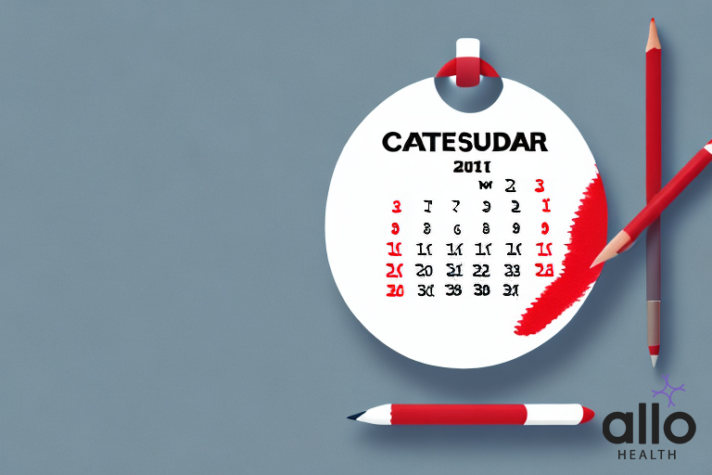When Will Your Periods Come After Taking Unwanted 72?

Allo Health is dedicated to personalized well-being, offering support and trusted information tailored to individual health goals. The platform emphasizes human-generated content, led by a distinguished medical team of experts, including physicians and sexual health specialists. Their commitment to credibility involves rigorous fact-checking, authoritative research, and continuous updates to ensure accurate, up-to-date information. Allo Health's unique approach goes beyond conventional platforms, providing expert-led insights and a continuous commitment to excellence, with user feedback playing a crucial role in shaping the platform's authoritative voice.

Dr. Warisha holds an MBBS degree from GMERS Medical College, Ahmedabad. She has an in depth experience on sexual and reproductive health and rights.
Why This Was Upated?
Our experts continually monitor the health and wellness space, and we update our articles when new information became available.
Updated on 21 March, 2024
- Article was updated as part of our commitment to diversity, equity, and inclusion.

"The following blog article provides information about a drug or brand name drug and its potential effects or benefits. However, it is crucial to understand that this information is intended for general educational purposes only and should not be considered a substitute for professional medical consultation. It is highly recommended to consult with a qualified healthcare professional before making any decisions regarding medication, treatment, or healthcare management.
Book consultation
Individuals have unique medical conditions, and the information provided in this article may not be applicable to everyone. Only a qualified healthcare provider can evaluate your specific medical situation, taking into account your medical history, conducting appropriate tests, and providing personalized advice and recommendations. They are equipped to make informed decisions tailored to your individual needs.
It is crucial to emphasize that self-diagnosis, self-medication, or disregarding medical advice can have serious health consequences. This article may reference specific brand names or drugs for illustrative purposes. Mention of these names does not imply endorsement, recommendation, or guarantee of their efficacy or safety. The choice of medication should be based on discussions and individualized guidance from a healthcare professional who has a comprehensive understanding of your medical condition.
"Unwanted 72 is a type of emergency contraception used to prevent unwanted pregnancies after unprotected sex or contraceptive failure. After taking Unwanted 72, a commonly used emergency contraceptive pill, many individuals may wonder about the timing of their upcoming menstrual period. Unwanted 72 is intended to prevent pregnancy by delaying or inhibiting ovulation, which plays a crucial role in the menstrual cycle. Most women ask the common question after taking Unwanted 72: “When will my periods come?”
This article will explore how Unwanted 72 may impact the menstrual cycle and when you can expect your period to arrive after taking the pill.
What is Unwanted 72 Pill?
- Unwanted 72 is a single-dose oral contraceptive pill that contains Levonorgestrel, a synthetic progestin hormone that prevents ovulation and fertilisation of the egg by the sperm.
- It is also known as ‘the morning-after pill.
- It is taken orally 24 to 72 hours after having unprotected sex.
- Levonorgestrel prevents the luteinizing hormone (LH) surge that triggers ovulation. Unwanted 72 aims to prevent or delay the release of an egg from the ovary.
- It is not intended as a regular form of birth control and should only be used in emergencies.
- Unwanted 72 does not stop a pregnancy that has already occurred.
- Unwanted 72 does not protect against sexually transmitted infections (STIs).
- It is also not 100% effective in preventing pregnancy and should not be relied upon as a regular form of contraception.
- It is always recommended to use a barrier method of contraception, such as condoms and hormonal methods, for maximum protection against pregnancy and STIs.
How Does Unwanted 72 Work?
The tablet works by employing a multi-step mechanism of action to help prevent pregnancy when taken within a specific timeframe after unprotected intercourse.
- Impact on FSH and LH: Levonorgestrel impacts the usual surge of FSH (follicle-stimulating hormone) and LH (luteinizing hormone) before ovulation. It prevents the rise of LH and FSH, which are needed for ovulation and follicle development. This could create a negative feedback loop, where the elevated levels of synthetic progestin signal to the body that ovulation has already occurred or is unnecessary, suppressing the natural release of FSH.Follicle-stimulating hormone (FSH) is primarily responsible for stimulating the growth and development of ovarian follicles in the ovaries. Luteinizing hormone (LH) surge triggers the release of a mature egg from the ovary during ovulation.Unwanted 72 also affects follicle-stimulating hormone (FSH), but its main mechanism is the suppression of LH, which prevents the release of an egg from the ovary.
- Inhibition of Ovulation: The main effect of Unwanted 72 is to prevent ovulation, or the release of an egg from the ovaries. It keeps the egg from being available for sperm fertilisation.
- Alteration of Cervical Mucus: Unwanted 72 works by altering the cervical mucus to make it difficult for the sperm to reach the egg. If fertilisation has already occurred, Unwanted 72 makes the uterus unsuitable for implantation of a fertilised egg.
- Impairment of Fertilisation: Unwanted 72 alters the fallopian tube environment, which may hinder the sperm’s ability to meet the egg for fertilisation. If fertilisation has already occurred, Unwanted 72 makes the uterus unsuitable for implantation of a fertilised egg.

While the tablet can significantly reduce the risk of pregnancy, it may not be 100% effective. Additionally, Unwanted 72 is not intended for regular contraceptive use and does not protect against sexually transmitted infections (STIs).
Uses and Benefits of Unwanted 72 Pill
- Emergency Protection: Unwanted 72 provides a lifesaving option for those who engage in sexual activity without proper contraception or when other contraceptive techniques are ineffective.
- Convenience: Unwanted 72 is a practical and affordable option for emergency contraception due to its over-the-counter availability and straightforward dose schedule.
- Timely Action: When taken as soon as possible after unprotected sex, the pill works best, highlighting the significance of prompt action.
- Reduced Risk: By preventing or delaying ovulation, Unwanted 72 lowers the chances of fertilisation, reducing the risk of unintended pregnancy.
Unwanted 72 should not be used as a regular contraception, as it is not as effective as other methods, such as birth control pills or condoms.
It should only be used in emergency situations, such as when a condom breaks or slips off during sex.
Dosage of Unwanted 72 Pill:
- The standard dose is one tablet containing 1.5 milligrams of levonorgestrel, the active ingredient in the emergency contraceptive Unwanted 72.
- It works best when taken as soon as possible, ideally within 24 to 72 hours (3 days) of unprotected sexual activity.
- The sooner you take it, the better the effect.
How to Take Unwanted 72?
- The tablet can be taken with or without food at any time during the day and should be consumed whole with water.
- If you vomit within three hours after taking the pill, take another pill as soon as possible because vomiting can make the pill ineffective.
- Vomiting would have prevented the proper absorption of the previous tablet.
When to Take Unwanted 72?
- Unwanted 72 is an effective pill when taken as soon as possible after unprotected intercourse.
- For maximum effectiveness, it is advised to take the pill within 72 hours (3 days) following the incident.
- The more frequently you take Unwanted 72, the more effectively it can stop pregnancies.
- If the pill is taken after 72 hours, the pill can be ineffective and does not restrict fertilisation.
What are Unwanted 72 Failure Symptoms?
- The potential warning signs of Unwanted 72 failure are missed periods, unexpected vaginal bleeding, and indicators of early pregnancy, including breast tenderness, nausea, or exhaustion.
- Vomiting within 3 hours of taking the pill also indicates failure.
After Taking Unwanted 72, When Will Periods Come?
- After taking Unwanted 72, you can expect your period to arrive within one week of taking the pill.
- One can expect withdrawal bleeding from 5 to 9 days later when the pill is taken near the expected period date.
- However, due to the hormonal changes caused by Unwanted 72, your menstrual cycle might be temporarily disrupted, causing your period to come earlier or later than usual.
- If your period is significantly delayed or you experience any unusual changes in your menstrual cycle, it’s recommended to take a pregnancy test and consult a healthcare professional for guidance.
Can Unwanted 72 Delay Your Periods?
- Unwanted 72 can cause changes in the menstrual cycle, including delaying or advancing the period.
- Delayed periods are more common than early periods after taking Unwanted 72.
- However, these changes are usually temporary and do not affect fertility in the long term.

Success Rate of Unwanted 72
- The success rate of Unwanted 72 is up to 95% if taken within 72 hours after unprotected sex.
- However, its effectiveness decreases with time, so taking it as soon as possible is recommended after unprotected sex or contraceptive failure.
Other Factors Affecting Timing of Period After Taking Unwanted 72
- The timing of the period after taking Unwanted 72 may vary depending on factors such as age, body weight, hormonal imbalances, stress, and underlying medical conditions.
- If the period is delayed by more than 2 weeks, it’s recommended to take a pregnancy test.
Possible Side Effects
- The common side effects of taking Unwanted 72 include nausea, vomiting, headache, fatigue, lower abdominal pain or discomfort, dizziness, changes in menstrual cycle, mood changes, breast tenderness and irregular bleeding.
- These side effects are usually temporary and go away on their own.
- However, if they persist, it’s advised to seek medical attention.
- Overuse of emergency contraceptives can lead to hormonal imbalances and other health complications.
- It’s recommended to use regular forms of birth control, such as condoms or hormonal contraceptives, to prevent unintended pregnancies.
- Taking Unwanted 72 frequently can disrupt the menstrual cycle and cause irregular periods. It’s recommended to use emergency contraception only in case of emergencies and not as a regular form of birth control.
- Additionally, it’s important to consult a healthcare provider if you experience any unusual symptoms or changes in your menstrual cycle after taking Unwanted 72.
When to Seek Medical Attention
- If your period is delayed by two weeks, unusually heavy, or prolonged, seek medical help. If irregular periods persist for three cycles or cause discomfort, consult a doctor.
- Severe abdominal pain, fever, or foul-smelling discharge may signal serious issues like ectopic pregnancy; seek immediate medical attention.
- Prioritise caution and seek advice for any concerns after using Unwanted 72.
- Emergency contraception should not be used as a regular form of birth control.
- Sexually active women should consider using a reliable form of contraception, such as condoms, birth control pills, or long-acting reversible contraceptives (LARCs) like IUDs or implants.
- It is also recommended to get tested for sexually transmitted infections (STIs) regularly and to discuss any concerns or questions with a healthcare provider.
How to Deal with Irregular Periods After Taking Unwanted 72?
- After taking Unwanted 72, experiencing irregular periods is common and often resolves within a few cycles.
- Leading a healthy lifestyle with exercise, a balanced diet, and stress management can aid in regulating the menstrual cycle.
- Natural remedies like ginger, turmeric and herbal teas like chamomile may help.
- Persistent irregularity or severe symptoms warrant medical attention, which may involve hormonal therapy or other treatments to address underlying issues.
Key Takeaways
- Unwanted 72 is an emergency contraceptive for preventing unintended pregnancies after unprotected sex or contraceptive failure.
- It contains Levonorgestrel, a synthetic hormone that prevents ovulation and fertilization.
- Unwanted 72 is not a regular form of birth control and should be used only in emergencies.
- It does not protect against sexually transmitted infections (STIs).
- The tablet works by inhibiting ovulation and altering cervical mucus and fallopian tube environment.
- Its effectiveness is highest when taken within 72 hours after unprotected intercourse.
- Unwanted 72 may cause temporary changes in menstrual cycle timing.
- Side effects may include nausea, vomiting, headache, fatigue, and changes in menstrual cycle.
- Regular use of emergency contraception is discouraged; use reliable birth control methods instead.
- Seek medical attention if period is delayed by two weeks or if experiencing severe abdominal pain, fever, or unusual discharge.
Frequently Asked Questions:
Q. How often can I use unwanted 72?
A. Unwanted 72 is designed for emergency use only and should not be used as a regular contraceptive method. It is intended as a one-time emergency measure after unprotected sex. Repeated use of Unwanted 72 within a short period can disrupt your menstrual cycle and hormonal balance.
Q. Can unwanted 72 protect against sexually transmitted diseases (STDs) And HIV / AIDS?
A. No, Unwanted 72 does not protect against sexually transmitted diseases (STDs) or infections (STIs). It is solely designed to prevent pregnancy by delaying or inhibiting ovulation. To protect against STDs/STIs, it’s important to use barrier methods like condoms consistently and correctly.
Q. Does it bleed after taking unwanted 72?
A. Bleeding or changes in menstrual bleeding patterns can occur after taking Unwanted 72. Some women may experience spotting, irregular bleeding, or changes in the timing of their periods. These changes are generally temporary and should normalize within a few menstrual cycles. If bleeding is very heavy or persistent, or if you have concerns, it’s advisable to consult a healthcare professional for guidance.
Q. How can I know unwanted 72 is working?
A. Within 72 hours of unprotected intercourse, Unwanted 72 is most effective. It works better when taken as soon as possible after unprotected sex. You can notice alterations in your menstrual cycle after using Unwanted 72, such as a slightly earlier or later period. These modifications can differ. Therefore, they are not a surefire sign of efficacy.
Q. Is unwanted 72 harmful to future pregnancy?
A. Unwanted 72 is designed for emergency contraception and is not intended to impact future pregnancies long-term. When used as directed within 72 hours of unprotected sex, it is generally considered safe and effective for preventing pregnancy in the current cycle.






































